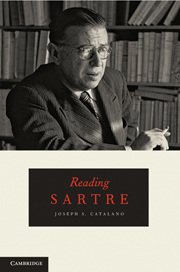1 - The Family Idiot
Published online by Cambridge University Press: 05 June 2012
Summary
Achille-Cléophas and Caroline Flaubert had plans for their children, and Sartre observes, that when parents have plans their children have destinies. Achille, the first born son, fulfilled his destiny by becoming a doctor like his eminent father, and Caroline, the only daughter, made a good match in marriage like her mother for whom she was named. Only Gustave, the second son, did not seem able or willing to conform to the family plan. He paid a price for his resistence. Sartre does not mince words: “Gustave's relationship with his mother deprived him of affirmative power, tainted his relationship to the word and to truth, destined him for sexual perversion; his relationship with his father made him lose his sense of reality” (2: 69).
Do parents have this much influence over a child? Usually parental presence is tempered by the influence of relatives and friends; but when the family structure is tight, as it was with the Flaubert family, the infant can enter the real world only through the family. But, if through lack of love, this door to the real world is closed, only one other path beckons the infant, that of the imaginary. (Later, the child or the adolescent may choose death.) Thus, the infant Gustave Flaubert chooses the imaginary. Too young to put a bundle of cloths over his shoulder and leave a home in which he felt unwanted, he found a way – as do many others – of keeping his fragile body at home while living elsewhere.
- Type
- Chapter
- Information
- Reading Sartre , pp. 3 - 20Publisher: Cambridge University PressPrint publication year: 2010



